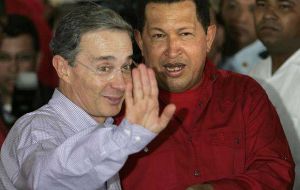MercoPress. South Atlantic News Agency
Chavez and Uribe “turn the page on a stormy past”
 Pte. Uribe and his counterpart Pte. Chavez (AP)
Pte. Uribe and his counterpart Pte. Chavez (AP) President Hugo Chavez of Venezuela and his Colombian counterpart Alvaro Uribe signed several agreements to promote closer ties, after months of political tension.
Speaking after a one-day meeting in Venezuela, Chavez said that a new era of co-operation was dawning and Uribe underlined he was sure the two countries could resolve their disputes. "A new era is beginning" Chavez, told reporters after meeting with Uribe. "We've decided, and we do it with goodwill and wholeheartedness, to go back to the path we had been building. We can completely turn the page on a stormy past." Relations hit their lowest point in March, when Mr Chavez sent troops to the border following a Colombian raid against a rebel camp inside Ecuador. Although the two countries are major trading partners, relations have suffered because their two leaders come from opposite ends of the political spectrum. Uribe is a conservative, pro market and close ally of the United States, while socialist Mr Chavez regularly denounces Washington and has allied himself with Cuba. The two men also differed sharply over Colombia's FARC, the Revolutionary Armed Forces of Colombia rebel group, with President Uribe adopting strong military action while Chavez gave the rebels ideological support. But the freeing of 15 high-profile FARC hostages, including former presidential candidate Ingrid Betancourt, by the Colombian army last week has strengthened Mr Uribe's position whose public opinion standing already high, in the range of 80% soared to 91%, according to the latest media reports in Bogota. At the height of their dispute earlier this year, Bogota accused President Chavez of funding FARC. Mr Chavez denies the claims, saying any contact was related to negotiations to secure the release of hostages it was holding. He also accused Uribe of being an "instrument" and a "lackey" of US imperialism. But President Chavez has distanced himself from FARC in recent weeks, calling on them to release all hostages and end their campaign of violence. Furthermore bilateral trade, over 6.5 billion US dollars, is too important for the neighbors, besides the fact that Chavez is facing elections next November for the National Assembly and governorships and needs Colombian imports to satisfy the domestic demand for food. The two presidents singed a number of accords on trade, taxes, energy and border co-operation including the increase of Colombian car exports, elimination of double taxation and improving infrastructure along the border. Chavez said they talked about plans to build a new railroad linking the countries.




Top Comments
Disclaimer & comment rulesCommenting for this story is now closed.
If you have a Facebook account, become a fan and comment on our Facebook Page!